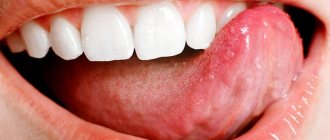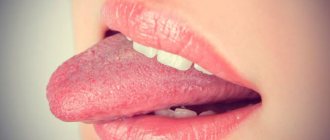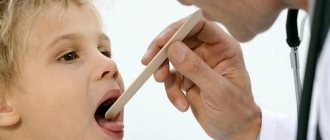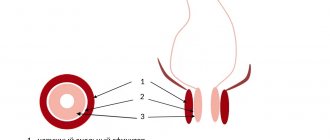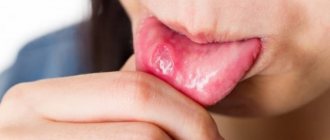The norm is a small formation of light or white color. But a yellow coating on the tongue and bitterness already indicate disturbances in the functioning of the body.
Any changes in the oral cavity are always scary and cause discomfort. A slight coating on the tongue is normal for both adults and children. However, if the formation has acquired an atypical hue and is accompanied by bitterness, then this may indicate signs of illness.
Content:
- The main reasons for the appearance of a yellow coating on the tongue
- How are diseases related to the condition of the mucous membrane?
- Important nuances when assessing the condition
- Treatment
- Prevention
A lot of bacteria live in the mouth. As on the teeth, plaque accumulates on the fleecy mucous membrane of the tongue .
In a small volume it does not pose a health hazard, but it is necessary to monitor its characteristics - it can be used to determine not only the hygienic status of the patient, but also the well-being of the entire body. The tongue is also called the “mirror” of health, what should it look like normally? If the mucous membrane has a pink tint, the taste buds are not irritated or enlarged, and there is either no plaque or does not cover the organ tightly and is white, then there is no pathology of the organ. There are other variants of the norm, because with changes in climatic conditions, nutritional patterns and lifestyle, the deposits change:
- intense light shade - in summer;
- white-yellow - in winter;
- yellowish or with a slightly brownish color - with frequent drinking of coffee, smoking.
An important diagnostic sign: plaque, which does not cause concern, is always easily removed and does not reappear too quickly. If you cannot clean the mucous membrane with a brush, a special scraper or a teaspoon, stop trying. They will only contribute to tissue irritation, inflammation, and discomfort.
In what cases does a yellow coating on the tongue indicate certain problems?
Signs of the presence of diseases of the gastrointestinal tract or kidneys include the appearance of a thick and dense yellow or yellow-brown layer, and a change in bad breath. This is only one of the symptoms; only a doctor can make a diagnosis after a full examination of the patient.
Children's diagnostics
A comprehensive examination will help determine the cause of yellow spots on the tongue.
A visual examination of the oral cavity alone is not enough to identify the true causes of the formation of yellow plaque.
Without additional diagnostics, even the most highly qualified physician cannot cope with this task. This is due to the fact that this symptom may indicate the presence of a wide variety of disorders.
That is why a comprehensive examination is carried out, a complete clinical picture is outlined and more in-depth studies are prescribed by a pediatrician, specialists in the field of gastroenterology, and dental care.
The main reasons for the appearance of a yellow coating on the tongue
In somatically healthy people, this phenomenon is most often caused by an irrational diet and unhealthy lifestyle - an abundance of spicy, salty, fatty foods, insufficient consumption of clean water, poor hygiene, bad habits, and a small amount of vegetables in the diet. By switching to a healthy lifestyle and increasing the amount of antioxidants and fluids consumed, giving up processed foods, smoking, alcohol and not skipping daily cleanses, you can completely get rid of the problem.
In addition to dehydration and the characteristics of the products consumed, the shade of layers on the mucous membrane (DS) is influenced by:
gastritis, gastroesophagitis, gastric ulcer, colitis, pancreatitis;- infectious, metabolic and other diseases of the kidneys, liver, gall bladder, pancreas - accompanied by the appearance of a bitter, metallic taste in the mouth, yellow-green or yellow-black layer;
- treatment with antibiotics causes an imbalance of microflora in the oral cavity, so some microorganisms are destroyed, while others begin to actively multiply;
- various medications that contain dyes or microelements that can pigment the layers on the tongue;
- Acute respiratory infections - sore throat, pharyngitis, influenza and other similar diseases are often accompanied by lining, swelling, pastiness of the mucous membranes, xerostomia, increased body temperature, and an increase in the population of pathogenic bacteria;
- Infections (fusospirochetosis, lichen, rubella, scartalina, foot and mouth disease) - a yellow or reddish, white-yellow coating appears on the tongue, unpleasant breath, spots on the mucous membrane and other manifestations;
- Irregular personal hygiene, gum disease, diseased teeth, root remains, chronic inflammation.
Methods for diagnosing the causes of pathology and basic principles of treatment
In order to get rid of the presence of a yellow coating on the surface of the tongue, the exact cause of its appearance should be established.
A large number of problems with the human body can lead to this condition.
To determine the exact cause of the pathology, it is necessary to conduct a whole range of examinations. Such examinations include the use of both laboratory and instrumental diagnostic methods.
Most often, the doctor prescribes the following diagnostic measures:
- General clinical analysis of blood and urine.
- Blood test for biochemical composition.
- Carrying out bacteria culture of plaque and determining the degree of susceptibility of identified pathogenic bacteria to the effects of antibiotics on them.
- A blood test to check for the presence of antibodies to the bacterium Helicobacter pylori.
- Ultrasound examination of the abdominal organs.
If gastritis is suspected, an additional endoscopy examination is performed.
If pathological phenomena in the form of bitterness in the oral cavity and a yellow coating on the surface of the tongue are detected, it is necessary to follow all the recommendations received from the doctor after examining the body.
Conducting timely and adequate therapy can significantly improve the patient’s condition and get rid of unpleasant symptoms.
The doctor's recommendations are as follows:
- strict adherence to hygiene procedures;
- adjusting the menu and diet when gastritis is detected;
- when liver pathologies are detected, appropriate drug therapy is carried out;
- maintaining an optimal drinking regime.
If necessary, the doctor prescribes a course of drug treatment, which completely depends on the type of pathology detected. Additionally, after consultation with your doctor, you can use traditional medicine as a component of complex therapy.
The use of medicinal methods to eliminate pathology
When yellow plaque and bitterness occur in the oral cavity, the main goal is to identify the cause of the pathology and eliminate it.
It is recommended that a person independently clean the surface of the organ twice a day using a soft toothbrush.
In addition, it is necessary to adjust the diet by excluding from the menu all products that contain coloring components; in addition, a person is advised to avoid eating spicy, fatty and fried foods. Doctors advise consuming more fermented milk products.
Drug therapy may require the use of the following medications:
- Choleretic - Allohol, Cholenzym, Liobil.
- Medicines to increase the tone of the biliary tract - Magnesia, Sorbitol.
- Hepatoprotectors – Karsil, Essentiale, Liv-52.
- In the presence of severe pain and spasms - Duspatalin, No-shpa.
- In the case of an inflammatory process provoked by a bacterial infection - cephalosporins, macrolides, fluoroquinolones.
- Preparations for normalizing the functioning of the gastrointestinal tract - Cerucal, Reglan.
- To cleanse the body of waste and toxins - medications from the adsorbent group, which include Filtrum, Polysorb, Enterosgel.
- Antiviral agents – Reaferon, Velferon.
If necessary, detoxification therapy and hemolysis can be carried out.
The treatment tactics used depend on the diagnosis, so only the attending physician can determine the need to use a particular drug.
How are diseases related to the condition of the mucous membrane?
Dietary habits, taking certain medications and alcohol abuse create increased stress on the liver. The function of the organ is impaired, problems are observed with the regulation of the produced volumes of bile and its excretion. Excessive gall bladder secretion accumulates in the body, leading to intoxication , which is reflected in changes in the type and intensity of plaque.
The same mechanism of accumulation of toxins occurs when the kidneys, which play one of the main roles in excreting human waste products, are disrupted.
With gastrointestinal pathologies, heartburn and reflux of gastric contents into the esophagus and larynx area are often observed, so the acid-base balance is disturbed, as is the self-cleaning of the organ. Also, an incorrect diet and bad habits contribute to the deterioration of metabolism, the accumulation of toxins and poisoning. Therefore, gastroenterologists must evaluate whether plaque is present and what its nature is.
Infections also increase intoxication, symptoms of dehydration, and local immunity decreases, so the qualitative and quantitative indicators of the microbiome in the oral mucosa change. The antibiotics taken fight the cause of the disease, while simultaneously influencing the populations of other microorganisms, so often a pronounced light, yellow, orange, brownish, or black coating is detected on the organ.
Some diseases are directly accompanied by deposits on the mucous membrane, for example, thrush. If hard-to-remove whitish layers accumulate on the villi, culture of the scraping and appropriate therapy are required. If the pathology exists for a long time and the patient simply did not turn to doctors, it goes into a chronic stage , so the color of the deposits often changes and turns yellow.
Folk remedies
Traditional recipes can help you cope with the symptoms. Decoctions of chamomile, flax seed and sage are used to rinse the mouth. Before using alternative medicine recipes, you need to know exactly why your tongue is yellow. If the pathology is associated with disruption of the gastrointestinal tract, then you can use the following means:
- Flaxseed tincture – 1 tbsp. l. of the herbal ingredient, pour 250 ml of boiling water and leave in a tightly closed container for 12 hours. The decoction is filtered and taken in the morning on an empty stomach, 250 ml.
- Decoction of plantain leaves – 2 tbsp. l. herbs are poured into 400 ml of boiling water and brought to a boil. The medicine is boiled for another 10 minutes and left for 1 hour. The product is taken 4 times a day, 50 ml on an “empty” stomach.
To prepare decoctions that stimulate the functioning of the gastrointestinal tract, St. John's wort, oregano, linden bark and corn silk are used.
Important nuances when assessing the condition
When examining the tongue, it is necessary to take into account some features of plaque:
- The thickness of the layers - the greater it is, the higher the likelihood that this is a pathology. If the mucous membrane under the deposits is not visible, then we are talking about serious or already chronic diseases.
- Damage area - coverage can be partial or complete.
- Consistency - soft, dense, dry, thick, curdled, flaky.
- Difficulty of removal - you need to check whether the contamination can be removed without effort.
This data allows the doctor to suggest specific diagnoses and then prescribe procedures to confirm them.
Symptoms associated with dry mouth
Dry mouth in most cases manifests itself as a complex of symptoms described as:
- "viscosity" or "stickiness" in the mouth;
- thirst;
- irritation of the oral mucosa (burning and itching), the appearance of a bright border of the lips, cracks on the lips and in the corners of the mouth;
- dry tongue. The tongue turns red and becomes rough. It becomes more difficult to speak, chew and swallow. Decreased taste perception;
- dry throat. The voice becomes hoarse and more hoarse;
- there is an unpleasant odor from the mouth.
Treatment
Selecting and testing new tools and devices to independently solve the problem is not very promising. In case of a systemic failure in the body, a certain bacterial, viral or fungal infection, local hygiene procedures are unable to overcome the disease , but contribute to the development of its advanced stages.
Who should I contact? If you have teeth that have been in need of treatment for a long time, the first thing you should do is make an appointment with a dentist. Sanitation of the oral cavity is a mandatory stage of therapy, even if it eventually turns out that the patient has other health problems.
Dentists are able to recognize infectious diseases; the only difference lies in their danger and prevalence. It is dentists who deal with lesions of the oral mucosa , and for systemic lesions, a referral is issued for examination by specialized specialists.
If there is an elevated temperature, treatment should begin with an appointment with a therapist, and in situations where there are already any confirmed diagnoses, a consultation with the attending physician (endocrinologist, infectious disease specialist, immunologist, etc.) is necessary.
Which doctor should I contact for dry mouth?
If you complain of dry mouth, you can contact your dentist or general practitioner (GP or family doctor). After identifying the cause that caused the feeling of dryness, you may be redirected to an endocrinologist, gastroenterologist or rheumatologist.
Most likely, you will need to undergo various tests (general blood count, general urinalysis, blood test for thyroid hormones, biochemical blood test, serological test), and, if necessary, undergo some instrumental studies (ultrasound, radiography, computed tomography).
Prevention
For people without any serious diagnoses of internal organs or immunity, it is important to pay due attention to personal hygiene. Often the problem is solved by treating problem teeth, replacing old fillings, crowns, and professional cleanings at the dentist.
It is worth following the recommendations for oral care:
- brush your teeth twice a day, as well as your tongue with a bristle brush;
- use rinses (antibacterial, herbal products);
- rinse your mouth after meals;
- Do not get carried away with products that irritate the mucous membrane.
It is useful to drink more water, stop smoking, alcohol abuse, self-medication, and also get into the habit of regularly visiting the dentist for preventive examinations.
When to see a doctor?
If the appearance of bitterness in the mouth is not associated with drinking coffee, burnt or poor-quality food, if the bitter taste appears regularly or persists for a long time, if it is accompanied by other symptoms, you should consult a doctor. This could be a dentist, if the bitterness in the mouth is associated with diseases of the teeth and gums, a gastroenterologist, if the cause may be diseases of the digestive organs or biliary tract, a hepatologist, if there are symptoms of liver disease.
Important!
In some cases, you need to urgently seek medical help. If bitterness in the mouth is associated with accidental ingestion of poison, if it appears along with other severe symptoms (difficulty breathing, swelling of the tongue, lips, difficulty swallowing, paralysis, changes in consciousness), you should immediately call emergency medical help.
